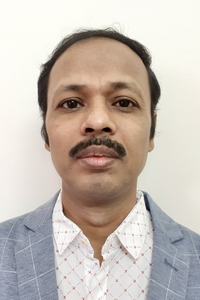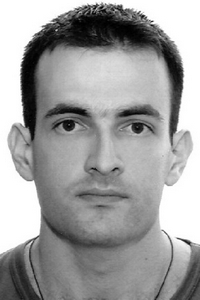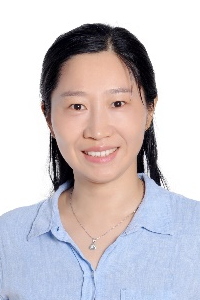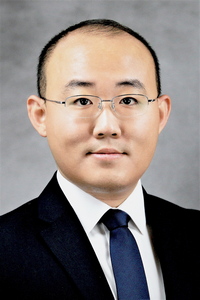CCCI 2025 Keynote Speakers

Ashok Kumar Das, CSTAR, IIIT Hyderabad, India
🔗
Blockchain Technology and Its Usages in IoT-Enabled Internet of Drones and AI/ML Security
Bio

Ashok Kumar Das (Senior Member, IEEE) received a Ph.D. degree in computer science and engineering, an M.Tech. degree in computer science and data processing, and an M.Sc. degree in mathematics from IIT Kharagpur, India. He is currently a full Professor with the Center for Security, Theory and Algorithmic Research, IIIT, Hyderabad, India. He is an adjunct professor at Korea University, South Korea. He was also a visiting research professor with the Virginia Modeling, Analysis and Simulation Center, Old Dominion University, Suffolk, VA 23435, USA. His research interests include cryptography, system and network security, blockchain, security in the Internet of Things (IoT), Internet of Vehicles (IoV), Internet of Drones (IoD), smart grids, smart city, cloud/fog computing, intrusion detection, AI/ML security, and post-quantum cryptography. He has authored over 480 papers in international journals and conferences in the above areas, including over 410 reputed journal papers. He was a recipient of the Institute Silver Medal from IIT Kharagpur. He was listed in the Web of Science (ClarivateTM) Highly Cited Researcher in recognition of his exceptional research performance. He is/was on the editorial board of IEEE Transactions on Information Forensics and Security, IEEE Systems Journal, Journal of Network and Computer Applications (Elsevier), Computer Communications (Elsevier), Journal of Cloud Computing (Springer), Cyber Security and Applications (Elsevier), Alexandria Engineering Journal (Elsevier), IET Communications, KSII Transactions on Internet and Information Systems, and International Journal of Communication Systems (Wiley). He also served as one of the Technical Program Committee Chairs of the first International Congress on Blockchain and Applications (BLOCKCHAIN'19), Avila, Spain, June 2019, International Conference on Applied Soft Computing and Communication Networks (ACN'20), October 2020, Chennai, India, second International Congress on Blockchain and Applications (BLOCKCHAIN'20), L'Aquila, Italy, October 2020, and International Conference on Applied Soft Computing and Communication Networks (ACN'23), December 2023, Bangalore, India. His Google Scholar h-index is 93 and i10-index is 313 with over 26,300 citations.
Abstract
The Internet of Drones (IoD) is widely used in a wide range of applications from military to civilian applications from the past years. However, during communication either with the control room/ground station server(s) or moving access points in the sky, security and privacy is one the crucial issues which needs to be tackled efficiently. In this direction, blokchain technology can be one of the viable solutions due to the immutability and traceability of various transactions and decentralized nature. In the first part, I provide in-depth challenges and issues of applicability of blokchain in Internet of Things (IoT)-enabled IoD environment. A blokchain based secure framework will be discussed for data management among IoD communication entities.
Data poising attacks are very serious concerns because they may play a significant factor for businesses and organizations for both financial terms and damaging their reputations, when the big data analytics on the analyzed data is itself corrupted. To mitigate this issue, in the second part, a blockchain-based Artificial Intelligence(AI)/Machine Learning(ML)-enabled Big data analytics mechanism will be discussed for IoT environment. The comprehensive experimental results have been provided under two circumstances: (1) performance of the ML model under data poisoning attacks and (2) performance of the ML model without data poisoning attacks.
Esma Aïmeur, University of Montreal, Canada
🔗
Trustworthiness and Deception in Generative AI and Cybersecurity
Bio

Esma Aïmeur is a Professor in the Department of Computer Science at the University of Montreal and the Director of the Artificial Intelligence and Cybersecurity Laboratory. She obtained her Ph.D. in computer science (Artificial Intelligence) from the University of Paris 6 (France).
She works on privacy and usable cybersecurity, developing and applying artificial intelligence techniques to manage personal data in e-learning, finance, and medicine. Her most recent research focuses on cybersecurity awareness, user-oriented attack detection, generative AI, deceptive AI, fake news, disinformation, ethics of AI, social networks, recommender systems, and privacy preservation.
For 10 years, she directed a master’s program in electronic commerce, a joint venture between HÉC Montreal, the Faculty of Law, and the Department of Computer Science. She was also appointed a member of the University of Montreal's Data Protection Advisory Committee. Her responsibilities include improving policies and decision-making in cyber education by providing best practices for protecting personal data.
In 2018, she was among the experts consulted by the Montreal Declaration of Responsible Artificial Intelligence development committee. In 2019, she represented the Natural Sciences and Engineering Research Council of Canada (NSERC) on the “Canada-UK Artificial Intelligence Initiative: Building Competitive and Resilient Economies and Societies through Responsible AI” project.
She was the PC co-chair of FPS, the 14th International Symposium on Foundations & Practice of Security, Paris, France, 2021, and Guest Editor of the special issue “Understanding and Mitigating Online Deception”, Frontiers in Artificial Intelligence, AI for Human Learning and Behaviour Change 2021. She was also PC chair of the track “Toward Adaptive Systems that Care: Privacy, Fairness and Transparency” of the 27th International Conference on User Modelling, Adaptation, and Personalization (ACM UMAP 2021), Cyprus, 2021.
Since 2021, she has been chairing the annual "IJCAI workshop on Adverse Impacts and Collateral Effects of Artificial Intelligence Technologies” (AIofAI). In 2022, she participated in the University of Montreal’s MOOC (Massive Open Online Course) on Artificial Intelligence with three capsules (Learning bias, anonymity, and ethics of artificial intelligence). Finally, she has been a member of the program committee of more than 400 international conferences.
For the second time, she was an honorary committee member and keynote speaker for WAICF, the World AI Cannes Festival, held in February 2025.
She is a member of the scientific orientation committee of the IMC2, the Multidisciplinary Institute in Cybersecurity and Cyber Resilience in Canada.
She is an associate editor for AI-Open, Computing and Artificial Intelligence, and for the journals Computer and Information Security and Artificial Intelligence for Human Learning and Behaviour Change. She is also a member of the International Observatory on the Societal Impacts of Artificial Intelligence and Digital Society (OBVIA).
Abstract
Generative Artificial Intelligence (GAI) is evolving rapidly and becoming a permanent fixture in our society. The landscape of cybersecurity and data privacy has been significantly transformed. This talk examines the multifaceted challenges and opportunities presented by these technological phenomena. It explores how Generative AI offers innovative tools for enhancing cybersecurity measures but also leads to new malicious threats, including prompt injection, reverse psychology, or even deceptive chatbots. Moreover, the proliferation of fake news, deepfakes, and misleading content across social media platforms is a growing problem because generative models can perpetuate stereotypes, leak private information, and produce deceptive outputs.
The era of generative AI makes robust cybersecurity measures, privacy protection, and ethical considerations more critical than ever. Innovative solutions and technologies will continue to be needed to increase awareness and education, and achieve faster legislation on Artificial Intelligence.
Christos Liaskos, Univ. of Ioannina & FORTH, Greece
🔗
Inter-networking Intelligent Materials for Software-defined Physics
Bio

Christos Liaskos received the Diploma in Electrical Engineering from the Aristotle University of Thessaloniki (AUTH), Greece in 2004, the MSc degree in Medical Informatics in 2008 from the Medical School, AUTH and the PhD degree in Computer Networking from the Department of Informatics, AUTH in 2014. He is currently an Assistant Professor with the University of Ioannina, Ioannina, Greece, and an Affiliated Researcher with the Foundation for Research and Technology Hellas (FORTH), Heraklion, Greece. He was the recipient of Elsevier Young Researcher award 2020 in recognition of his work on software-controlled materials, including foundational studies on software-defined metasurfaces. He serves as an Editor for IEEE Transactions on Communications and the ITU Journal of Future and Emeging Technologies. His research interests include metamaterials, computer networks, traffic engineering, and novel schemes for resource allocation in the context of software-defined physics.
Abstract
This talk will study the use of intelligent materials as enforcers of software-defined physics. Intelligent materials can tune their physical properties (electromagnetic, acoustic, mechanical and thermal) by receiving software commands. When incorporated merging computing, communication, software development and physics in the process. The talk begins by surveying existing artificial materials in the electromagnetic domain, outlining their operating principles, as well as the necessary hardware, software and networking abstractions for controlling their macroscopic physical properties in real time. Then, the discussion extends the same principles to artificial materials of any physical domain, enabling the Internet of Materials (IoM). Finally, we survey promising applications of the IoM across multiple sectors, highlighting their technical challenges and gain potential.
Yuanjun Laili, Beihang Univ., China
🔗
Knowledge-driven Forward and Backward Inference for Discrete Manufacturing
Bio

Yuanjun Laili is a Professor with the School of Automation Science and Electrical Engineering, Beihang University, Beijing, China, and with Zhongguancun Laboratory, Beijing, China. She received the BS, MS, and Ph.D Degree in Automatic Control from the School of Automation Science and Electrical Engineering at Beihang University, in 2009, 2012, and 2015, respectively. She is a chief scientist of the National Key R\&D Program of China, a council member of ASIASIM. Her research interests include configurable intelligent optimization and complex system modeling and simulation with applications to Industrial Internet-of-Things platform. She has won the "Young Talent Lift Project" supported by China Association for Science and Technology, the "Young Simulation Scientist Award" from SCS, and the “Beijing Nova Program” supported by Beijing Natural Science Foundation.
Abstract
Discrete Manufacturing for complex product involves multiple stages with multi-discipline. It produces a vast amount of heterogeneous data with long-tailed distributions and sparse value. Under this scenario, cross-domain forward and backward inference is of great importance for the intelligent and autonomous manufacturing process. However, current industrial knowledge inference methods rely heavily on manual intervention, requiring human experts to parse problems and retrieve answers from knowledge bases. To overcome this drawback, this presentation summarizes two knowledge graph construction methods, proposes a knowledge graph embedding algorithm, and establishes an industrial cross-domain inference model for forward and backward inference in supply chain relationship, product composition relationship, and product machining relationship.
Xiaoli Luan, Jiangnan Univ., China
🔗
Pattern-based process modelling and optimization
Bio

Xiaoli Luan received the B.Sc. degree in industrial automation and the M.Sc. and Ph.D. degrees in control theory and control engineering from Jiangnan University, Wuxi, China, in 2002, 2006, and 2010, respectively. She is currently a Professor with the Institute of Automation, Jiangnan University. She was a Visiting Professor with the University of Alberta, Edmonton, AB, Canada, in 2016. She hosted and participated several research programs funded by the National Natural Science Foundation. Her research interests include robust control and optimization of complex industrial process. She has authored or coauthored more than 100 articles in professional journals, conference proceedings, and technical reports in these related areas. Prof. Luan has served as a reviewer for a number of international journals
Abstract
Process variables can only reflect operational behavior in a distributed and partial manner, while the overall status of the process runs according to a latent pattern, which can statistically extract the holistic information contained a set of process variables. To this end, a new framework for pattern-based process modelling and optimization is proposed. Under the geometric projection method, a dynamic-controlled principal component analysis is designed for pattern modelling, of which the state of the art lies in explicitly quantifying the dynamic causality from control inputs and pattern for the first time. To further reveal the process uncertainties, a probabilistic dynamic-controlled pattern modelling method is proposed under the probabilistic generation, where the pattern dynamic is characterized by an auto-regressive with extra inputs structure for Bayesian inference. Specially, the algorithms for expectation maximization, forward filtering and backward smoothing are designed for model learning. After pattern modelling, a dynamic reference programming (DRP)-based model predictive control (MPC) is proposed for optimal pattern tracking. The DRP can overcome the disadvantage of traditional tracking MPC in that parameter settings are closely dependent on setpoints, and effectively enlarge the feasible set of optimization problem.
Jingxiao Ma, Tongji Univ., China
🔗
Privacy-Preserving Collaborative Intelligence in Vehicular Networks: Towards Trustworthy AI
Bio

Dr. Jingxiao Ma is an Assistant Professor at the School of Electronic and Information Engineering, Tongji University, China. His research interests include vehicular networks, federated learning, privacy-preserving computation, and intelligent transportation systems. He has published more than 20 academic papers, including top-tier journals and conferences in wireless communications and security. He also serves as a reviewer or editorial board member for several international journals. Dr. Ma has led or participated in multiple national and municipal research projects focused on secure data sharing and intelligent mobility.
Abstract
As AI applications increasingly permeate critical infrastructures such as transportation, healthcare, and industrial systems, safeguarding data privacy while ensuring algorithmic reliability becomes a central concern. This keynote investigates the evolving landscape of privacy-preserving machine learning and federated intelligence, focusing on frameworks that support secure, decentralized computation across heterogeneous and resource-constrained networks.
We will discuss the system-level design of privacy-enhancing technologies (PETs), including secret sharing, secure aggregation, and explainable federated learning. Emphasis will be placed on practical deployment challenges such as model drift, communication bottlenecks, and privacy-policy compliance, alongside strategies to address them within real-world constraints.
To ground the discussion, several representative application scenarios will be examined — edge intelligence and distributed sensing in vehicular networks. These case studies will help clarify trade-offs in scalability, accuracy, and security, offering insights into how privacy-aware mechanisms can be pragmatically integrated into intelligent systems operating in open and partially adversarial environments.
Fangyu Li, Beijing Univ. of Technology, China
🔗
State Representation-Driven Reinforcement Learning for Dynamic Scheduling in Flexible Manufacturing Systems
Bio

Dr. Fangyu Li is a professor with Beijing University of Technology. He has been listed among Stanford University's World's Top 2% Scientists and ScholarGPS' Top 0.5% Global Scholars. His research interests include distributed system analysis, dynamic control, and optimal scheduling. His research achievements include over 100 journal papers published in IEEE Transactions and renowned international journals, along with more than 100 international conference papers. His work has received over 4,400 citations with an h-index of 38. Prof. Li actively contributes to the academic community as an Editorial Board Member and Associate Editor for journals such as IEEE Transactions on Industrial Cyber Physical Systems. His accolades include the SEG J. Clarence Karcher Award, IEEE Mark Weiser Best Paper Award, Geneva International Invention Award, Scientific and Technological Progress Award from the Chinese Association of Automation, and so on.
Abstract
Traditional rigid production models fall short in meeting the demands of modern large-scale manufacturing, which is increasingly defined by high product variety, small batch sizes, and rapid delivery expectations. Conventional flexible scheduling methods—typically based on heuristics or rule-based strategies—perform adequately only in limited-scale settings and lack the adaptability required for more complex environments. To address these limitations, we propose a novel state representation framework that effectively captures the dynamic, global state of flexible manufacturing systems. By reformulating the scheduling task as an optimization problem over evolving system information, we quantify uncertainties and interdependent resource constraints within the environment. This representation enables the development of a reinforcement learning algorithm that operates without reliance on fixed rules or oversimplified assumptions. The proposed method supports efficient, multi-objective, and constraint-aware scheduling in dynamic, large-scale settings, offering a scalable and intelligent solution for flexible manufacturing systems.